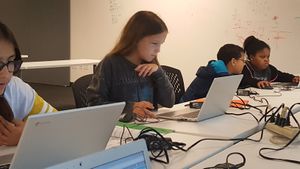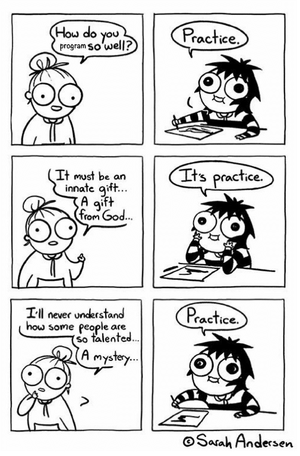Growth mindset
From Bold Idea Knowledgebase
A lot of research today shows that a student's attitude toward learning has a huge effect on their learning outcomes. We call that mindset.
Mindset focuses on their attitude to whether they think they can get better.
- Growth mindset is the belief that intelligence can be developed. Students with a growth mindset have different responses to feedback and failure. They understand they can get smarter through hard work, the use of effective strategies, and help from others when needed.
- Fixed mindset is the belief that intelligence is a fixed trait and is set in stone at birth.
| FIXED MINDSET | GROWTH MINDSET |
| I'm not good at this. I'll never be good at this. | What could I try next? |
| I give up. | This may take some time and effort. |
| I'm not a math person. | I'm going to train my brain in math. |
| This is too hard. | I'll use some of the strategies we've learned. |
| I failed. | When I fail, I learn. |
| She's so smart. I will never be that smart. | I'm going to figure out how she does it, so I can try it. |
How to Promote a Growth Mindset
Mindset is actually highly malleable. Simple interventions can switch students from a fixed mindset to a growth mindset.
- Change how you interact with students. For example, students adopt a growth mindset when adults focus praise on process rather than ability. You might say: "I like how you tried all kinds of strategies on that problem before you finally got it."
- Celebrate failure and bugs. We want to develop students who can learn from failures. We want them to know it's ok to fail, because that's how we learn, and how we build grit. It's their willingness to try a new strategy after failure that will get them to their goal. If they encounter a bug in their program, say: "That's awesome! What can we try next?" Students need to learn to be risk takers. You may even want to start a bug jar. Add a plastic toy bug to the jar every time a student identifies and addresses a coding bug.
- Watch the short failure clip from the movie, Meet the Robinsons. Have a group discussion about the two reactions to Louis' failure.
- Consider your own mindset. Is it fixed or growth? Do you believe that some kids just 'get it' when it comes to coding and others never will? Or do you think students can learn anything with enough practice. Your growth mindset is highly valuable! When you believe a student can improve, you will help them make steps to improving.
- Ask students to reflect on their learning. Use open-ended questions in your Reflection Time (at the end of the session), or one-on-one, including: What did you do today that made you think hard? What mistake did you make that taught you something? What strategy could you try next?

